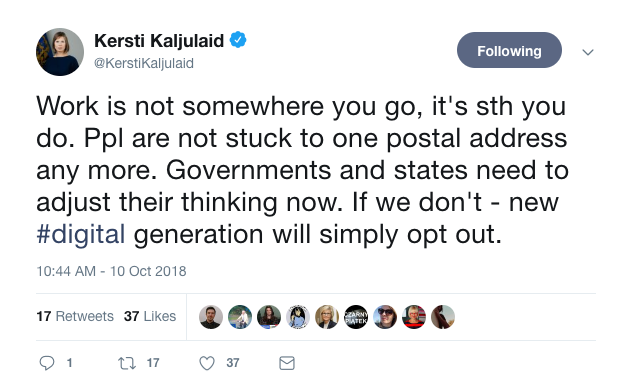Working remotely and how to make it work
The president of my country tweeted about remote work today and as an off-site freelance iOS developer, that made me think of how does it work for me.
The tweet was as follows:
Work is not somewhere you go, it’s something you do. — Kersti Kaljulaid

Though I do it for a variety of reasons listed later in this article, the ability to work remotely from my own secure space is one of the main reasons I’ve chosen the unstable path of freelancing.
The first sentence of an email reply to recruiters and potential clients usually goes something like this for me: „I can jump in the office for meetings and when I’m really needed, but I work from my own office.“. While there are many exceptions, that usually makes them discard me as a potential team member.
I’m not a shy or awkward person and am not afraid of other people or work environments. I actually consider myself quite sociable. When I get a new client I can work at the office for the first two weeks to a month to get to know people. After that however I prefer to move back to my own space.
I guess working remotely has it’s pros and cons, but why do I prefer working this way?
During my professional career I have developed a set of unorthodox habits of how I operate. This makes me somewhat “incompatible” at the office. There are several reasons for my incompatibility.
Energy drain
There is many introverts working in software development. It might even be safe to say that this field is the one with highest percentage of introverts. When working at the office I meet them all the time. Most of the time it’s fun as introverts like socialising too, but there are so many days when I see them prefer not to talk to anyone. They would rather work alone, but they have to be present because of their job description requires them to.
Like all introverts, socialising drowns my energy. I can do it for a set period of time but then I need to charge batteries again.
I’m an introvert too. When working at the office with other people (especially in an open office) I feel really exhausted after couple of weeks. That’s not because of long hours or hard work, but because I’ve given out so much energy that I really need to spend time alone to gather my strength.
Night owl with an irregular schedule
I have a really irregular work schedule. I can work late nights until 3-4AM easily and actually do the best work when I’m undisturbed and lights have turned out in the city. This means I sometimes sleep until 11 in the morning.
Other times however I can be an early bird, wake up at 6 or 7AM and start working and feeling really happy about it (this happens less than I’d like to admit).
This gives me an advantage when working for clients in different time zones. But it’s really bad when it’s an agile environment and I gotta attend daily at 9AM every morning. That means sometimes you’ll see a zombie attending those meetings.
Pomodoro breaks
I sometimes use the Pomodoro technique while working. This means I’ll be deep in the code for 25 minutes and then taking a 3-5 minutes break. During those 3-5 minutes I like to play my guitar. Oftentimes I don’t really play a song but I fiddle around with it making weird noises trying to come up with new songs and melodies.
This habit would not work in an office as my playing usually is rather loud. But it relaxes me and turns my brain off from programming really nicely.
Napping at work
I usually take a nap during the day. It’s usually 29 minutes of meditative/sleepy state that resets my brain. This really works and I do recommend this habit to everyone.
This special short powernap starts a new day. It usually happens around 3 or 4PM. I lay down or sit in a comfortable chair, put my headphones on with guided meditation (Calm app works really nicely) and set a timer to 29 minutes. Then I just let my mind go blank. Sometimes I fall asleep briefly, sometimes I don’t.
After this special nap I’m rested similar to a good night sleep. I take a coffee and work like it’s morning again. This habit gives me 2 days in one day.
Unfortunately very few offices support napping. To get this nap I have to find a quiet corner and I have to be alert while at it as people might jump in on me. This makes this nap less effective.
Workplace noise
I write computer code for work. This means I’ve got a bunch of short-term information stored in my brain all the time when I do the work (let’s call them class variables). People discuss stuff at the office and this is often distracting. If I get distracted I sometimes forget some of the class variables. That means I gotta go back and check them again and this takes time and is frustrating. This is the reason I have my headphones banging instrumental music (house or techno does it right now) when I work.
Workplace noise sometimes is nice when you have time to converse with fellow co-workers, but won’t work when you’re under a tight schedule. The latter is mostly the case for me.
Extroverted world
I guess office life is an extroverted system and I totally understand the benefits it gives to the company.
Managers expect synergy. We’re supposed to communicate and work as teams. Hence we have to be present during work hours. It’s also easier to manage projects and lead the company when at a same office.
Still there are so many people who do their best thinking at night at their favourite secure place and showing up every morning actually steals quite a big chunk of time from this vibe. How can I be up working at 3AM and then be happy, shining and slept at the office at 9AM?
I often talk to recruiters and HR people and unfortunately very few companies actually support remote work. I somewhat understand if it’s a fin-tech company or a government office with really strict rules of security, but startups and other type of software companies would most likely work much more efficiently if they would support remote working.
Clients do not come first. Employees come first. If you take care of your employees, they will take care of the clients. — Richard Brandson
Supporting remote work would show employees that they are valued and trusted and would make many people really happy and I’m sure it would make the company value to increase among employees. Many successful companies actually do it.
How do I make working remotely work
As a seasoned freelancer I have a (non-written) manifesto that I am available almost all of the time. We have cellphones. I can answer an important client call or reply an email at any time and I actually do that. I never disappear. That might be a downside of freelancing as I never get time off, but it eases the problem of me not being present physically.
I’m also in contact with coworkers via Slack or Skype or any other software. These chat based systems are actually way better than phone calls because I can scroll back to the stuff that was said. I have several group chats open at my desktop all the time so it’s like a constant ongoing meeting and I think it’s even more effective than 1hour slot at a corporate meeting room.
Thanks to communication technologies we can make synergy happen and work to flow even more efficiently when working remotely and managers should not really dread it so much.
Conclusion
Many companies have embraced 100% remote policy and I believe this is the way of the future.
Some people love to show up in the morning. That’s how they maintain a perfect work-life balance. Others don’t. They do their best work at an odd hour somewhere else than in an office.
The goal of a company should be to empower people to do their best no matter where or which hour. This can only be achieved if they give people the space they need. Winning software companies support remote working culture. That is how they bring out the best in people and make sure they are highly valued among employees.


